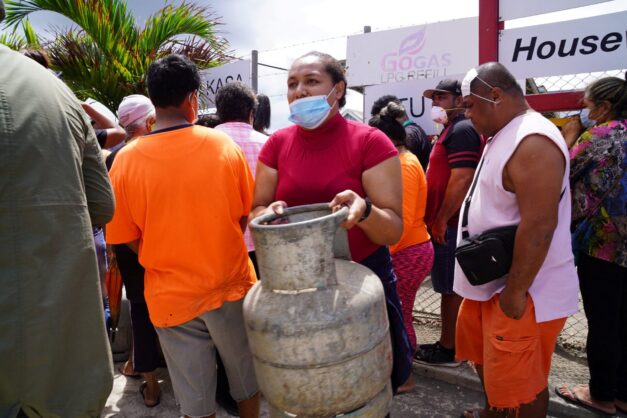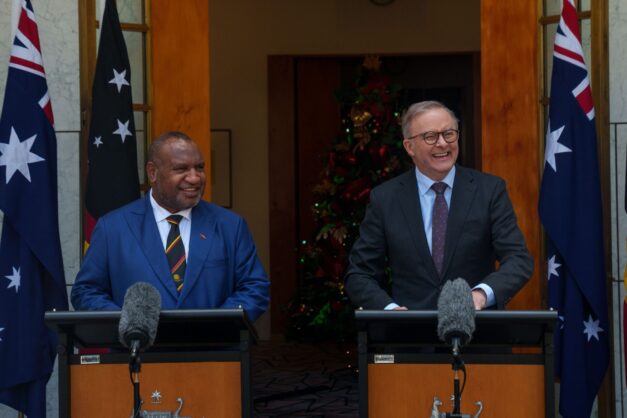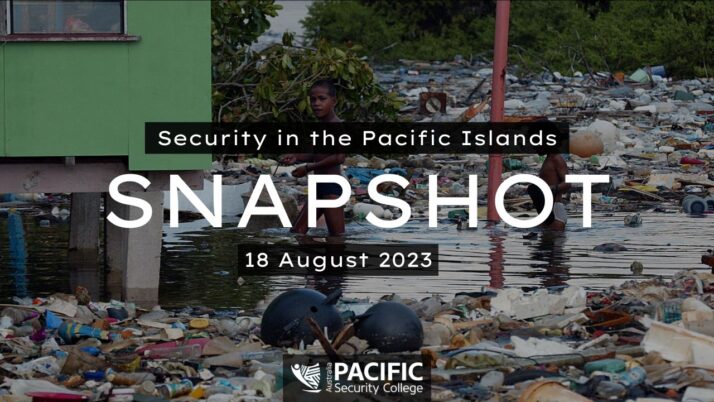Rethinking Human Security in the Pacific

A woman carries a refilled gas container ahead of Tonga’s first lockdown on February 2, 2022, after Covid-19 was detected in the Pacific Kingdom as it struggled to recover from the deadly January 15 volcanic eruption and tsunami. Mary Lyn FONUA / Matangi Tonga / AFP
Is it time for a paradigm shift?
Pacific states, their partners, and scholars of the region must continue to evolve their understanding of the region’s security landscape as new threats emerge, Danielle Watson, Jeremy Brice, and Safua Akeli Amaama write.
The security landscape in Pacific Island countries (PICs) has often involved significant improvisation and creative adaptation. This is evident now, as Pacific states secure their borders against COVID-19 and build regional resilience to the impacts of environmental change.
The geopolitical, cultural and environmental specificities of the Pacific region should challenge scholars and practitioners to rethink traditional conceptualisations of and approaches to security.
For security service providers in PICs, functioning with limited resources and adapting to increasing stakeholder demands are further compounded by geographic context. The region presents unique spaces, which means that traditional challenges exist alongside unconventional security issues that are specific to island territories.
The region has a rich history of multiple security service actors operating within respective jurisdictions. There is a significant amount of work on the plural regulatory systems in several PICs as well as legitimacy complications born of conflict among traditional and state systems. Pandemics, climate change, natural disasters, changing political climates and other insecurity factors usually translate into further cuts to already strained budgets.
Donor aid and ‘gifts’ from foreign stakeholders have often had implications for how security is conceptualised and for how security service organisations operate, leading scholars to develop critical accounts of what foreign aid looks like in PICs.
For instance, New Zealand’s active role in Pacific regional organisations has provided it with opportunities to influence questions of regional security. Notably, the emphasis of the Ardern government’s defence statements and draft migration plan on enabling their citizens to remain in place despite climate change impacts finds echoes in recent developments in the environmental security agendas of Pacific regional organisations.
The Boe Declaration on Regional Security asserts “that climate change remains the single greatest threat to the livelihoods, security and wellbeing of the peoples of the Pacific” and affirms “an expanded concept of security inclusive of human security, environmental security, and regional cooperation in building resilience to disasters and climate change”.
Security studies scholars continue to question how countries’ position on environmental security can affect conflict between states or political-economic instability within their borders. Critical scholars have focused on a human security discourse emphasising the potential for environmental change to compromise citizens’ and communities’ access both to basic goods and services such as food, water, energy and healthcare – shifting the object of security from states to citizens.
In recent years, regional powers such as Australia and New Zealand, as well as regional organisations such as the Pacific Islands Forum, have begun issuing security statements and policies which emphasise issues of human security. However, while initiatives such as New Zealand’s ‘Pacific Reset’ and Australia’s ‘Pacific Step-up’ policy conceive climate change as presenting an immediate threat to the human security of PIC citizens, this concern is often coupled with an interest in averting international migration due to future climate change impacts.
Here, investment in human security and sustainable development is used as a means of building the resilience of PICs, and thus enabling their citizens to remain in place despite climate change impacts. In the process, contemporary state and intergovernmental actors’ attempts to govern environmental change in the Pacific entwine human security with national security in deeply unequal ways – converting investment in human security within PICs into a means of maintaining the national security of regional nation-states into the future.
The COVID-19 pandemic has accelerated tensions and anxieties surrounding health security in how governments have – and continue to – respond. While states have mobilised to lessen the impact on their citizens, the broader implications of measures to contain the virus have been felt in multiple ways. Government policies to counter the pandemic impact have often included the instigation of states of emergency with shifting conditions and criteria.
There is an emerging body of work highlighting cultural responses to the pandemic through the instigation of measures to safeguard communities. Recent analysis by Steven Ratuva and others have proposed the ‘integrated social protection approach’, referring to multi-stakeholder partnerships – between the state, not-for-profit-organisations and the Pacific community – with a view to enable participation, equity and resource power distribution.
Cultural and health security discussions across the Pacific acknowledge the continuously shifting regional landscape with multiple regional agencies navigating the way forward. The Pacific Islands Forum, while it celebrates its 50-year milestone, is undergoing a major phase of membership change, which will impact and shape key strategies for the greater region.
The global pandemic has accelerated the need to revise measuring tools for cultural wellbeing and health, to further investigate cultural and health security concerns and to consider what a post-COVID-19 world looks like.
As new insecurities materialise in the Pacific, it will be important for researchers and other actors to investigate how they might be remaking the region and its security landscape.
Danielle Watson, Jeremy Brice, and Safua Akeli Amaama
This piece was originally published on Policy Forum.
More Stories

Blog - 11 Dec 2023
A PNG-Australia security framework: not a treaty but solid nonetheless
Papua New Guinea PM James Marape and Australian PM Anthony Albanese face the media after signing a historical Bilateral Security Agreement on 7 December in Canberra. Credit: PM Albanese Facebook On 7 December 2023, the prime ministers of Australia and Papua New Guinea signed an historic security agreement in Canberra. It has taken approximately…

Security Snapshot - 18 Aug 2023
Pacific Security Snapshot | 18 August 2023
The security stories shaping the region ➣ Pacific Resilience Facility endorsed at the Forum Economic Ministers Meeting ➣ The Pacific Climate Security Assessment Guide ➣ French President Macron visits Papua New Guinea and Vanuatu ➣ US Secretary of State and Secretary of Defence in the Pacific ➣ Bougainville eruption leaves 8,000 displaced Climate Security Ministers…






